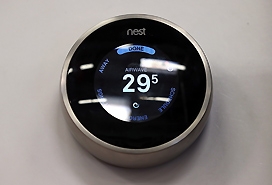(单词翻译:单击)

To understand why Google has just paid $3.2bn for a company that makes thermostats and smoke detectors, you need to look at some of its earlier attempts to invent the “smart home”.
要弄明白谷歌(Google)为何刚刚斥资32亿美元收购了一家生产自动恒温器和烟雾报警器的公司,你有必要考察一下它早些时候在发明“智能家居”(smart home)方面所做的一些努力。
These were more than simply object lessons in what not to do. Past efforts, though resulting in failure, highlight the range of Google’s capabilities – and why, following this week’s acquisition of Nest Labs, it looks to have taken a formidable lead in a tech market that has barely been invented yet.
那些努力不仅仅是一些表明什么不该做的实例教训。尽管谷歌过去的努力未获成功,但它们却凸显出两点。第一点是谷歌的能力范围。第二点是为什么在上周收购了Nest实验室(Nest Labs)之后,谷歌似乎已在一个迄今几乎还未被创造出来的科技市场取得了难以撼动的领先地位。
Google’s first attempt, five years ago, took the form of an internet service called PowerMeter. This was an online service for monitoring home energy use. It turned out that most people had better things to do than track their energy consumption on a website.
五年前,谷歌的第一次努力表现为一个名为PowerMeter的互联网服务。这是一个监控家里能源使用情况的在线服务。不过事实证明,大多数人还有更重要的事情要做,没工夫在网上跟踪家里的能源消耗情况。
Next came a software platform known as Android@Home, which was aimed at other manufacturers that want to build the “smarts” into internet-connected objects for the home. The first of these products was meant to be an LED lightbulb that could be turned on using a smartphone app. The manufacturer abandoned the idea before it was launched.
接着,谷歌推出了一个名为Android@Home的软件平台。这个平台针对的,是其他想在家居联网设备中嵌入“智能”的生产商。首个此类产品原本会是一个可用智能手机应用点亮的发光二极管(LED)灯泡。但生产商在推出这一产品前放弃了该创意。
An internet service and a software platform were fine ideas as far as they went. The missing ingredient was a truly useful piece of intelligent hardware. Or, to be precise, an appealing, easy-to-use consumer product that bundled a desirable set of capabilities with an intuitive interface: software, hardware and online service working in concert to make life around the home better.
就其本身而言,互联网服务和软件平台都是不错的创意。缺失的元素是真正有用的智能硬件——或者确切地说,是有吸引力而又易于使用的消费产品。这种产品应该把一系列人们想要的功能用直观的界面包装起来:软件、硬件和在线服务能协同工作,令家居生活更美好。
So who better to turn to than Tony Fadell, whose claims to fame include being lead inventor of the iPod and founder of Nest? Apple’s music player was the gadget that launched the modern consumer hardware revolution. Pleasing in itself, the iPod would have been nothing without the software and online store that brought the digital music business to life.
那么,还有谁是比托尼•法代尔(Tony Fadell)更适合的整合人选呢?法代尔名气很大,他既是iPod的首席发明家,又是Nest的创始人。iPod是苹果(Apple)的音乐播放器,正是这款小型电子产品开启了现代消费类硬件的革命。不过,尽管iPod本身的样子很讨喜,但如果没有让数字音乐业务焕发生机的软件和在线商店,它可能什么都不是。
Mr Fadell went on to embed his iPod lessons in Nest’s thermostat, right down to the wheel-like control for programming the unit. (Honeywell has fired off a legal challenge, claiming that the circular control unfairly copies one of its own inventions.)
法代尔随后将他在iPod上取得的经验融入到Nest的自动恒温器中,就连后者的编程界面也沿用了前者的那种环状控制器。(不过,霍尼韦尔(Honeywell)发起了一项法律诉讼,称这种环状控制器剽窃了该公司的一项发明。)
A Nest thermostat taps into online weather forecasts and information from its own sensors about a user’s movements to guess the best temperature to set.
Nest的自动恒温器能利用在线天气预报和其自身传感器获取的用户移动信息,来推测应设定的最佳温度。
This is where Google comes in. While it may take a product visionary such as Mr Fadell to come up with the idea, the device is nothing on its own. In an interview with the Financial Times, the Nest founder was forthright about what is involved: 80 per cent of the work behind his company’s products goes into building and running the infrastructure on which they depend.
这正是用到谷歌的地方。尽管提出这一创意可能需要像法代尔这样对产品有远见的人,但这种设备单靠自身其实发挥不了什么作用。在接受英国《金融时报》采访时,这位Nest创始人坦率地谈到了需要做的工作:在该公司产品背后,80%的工作都是建设和运营其产品所依赖的基础设施。
There are few better infrastructures to plug into than the one operated by Google. It is not just the scale of its data centres or the capacity of its broadband networks: the internet company could also be in a good position to turn data collected by Nest’s devices into valuable intelligence.
就Nest产品所连接的基础设施而言,没有哪一家能比谷歌运营的设施更好。这不仅仅是因为谷歌数据中心的规模或其宽带网络的能力,还因为这家互联网企业能够轻易地将Nest设备收集的数据转化为极有价值的情报。
In this it can bring two assets into play. One is Google’s own vast trove of data. Combining Nest’s data with information from its other services promises to give Google unrivalled insights into your preferences – not just the temperature you like to wake up to, but how long you linger over breakfast before heading to work and what route you take to get there.
从这点来说,谷歌可盘活两大资产。其一是该公司自己拥有的海量数据库存。谷歌如果能将Nest的数据与自己旗下其他服务获取的数据结合起来,将有望对用户的偏好形成最为透彻的认识——不仅能知道你醒来时喜欢的室温,还能知道你上班前会在早餐上消磨多长时间,以及你会走哪条路上班。
The other important asset is the skills needed to make use of all this data, such as developing algorithms that will turn it into intelligence that can be used to inform useful services. If Google could anticipate when you were about to leave home in the morning, it could alert you to up-to-the-minute commuting conditions, and make sure your home was properly secured.
另一个重要资产是对以上所有数据加以利用所必需的技能,比如研发算法的技能——这种算法可把数据转化为情报,通报给一些有实用价值的服务。如果谷歌能预判出你早晨大约什么时候离开家,它就能向你提示精确到分钟的通勤状况,并确保你的住宅得到妥善保护。
Privacy fears are certain to raise their head. But a smart home that truly understands and can respond to your needs might overcome those concerns. And if Google tried to use data from around the home to serve up even more relevant adverts, it would be part and parcel of the tacit compromise its users have long accepted.
当然,这一定会引发隐私方面的担忧。不过,一个能够真正理解并响应你需求的智能家居系统,可能会让你把这种担忧放在一边。即使谷歌试图利用从你家中得到的数据向你展示更多相关广告,也不能算是突破了其用户长期以来已经接受的一种心照不宣的妥协。
At least that is the theory. There is much to do to prove that it can work. Making smart household objects desirable will not be easy. Customers of Nest’s smoke alarms talk far less enthusiastically than those of its thermostats.
至少从理论上说是如此。要证明这种方式能够奏效,还有很多事情要做。生产人们喜欢的智能家居设备不会是件容易事。Nest烟雾报警器受到的追捧就比自动恒温器少得多。
Google also has to show that it can make serious money as it moves deeper into hardware, where profit margins are lower. But if it can get all the parts of the smart home working together while also coming up with hit new gadgets, it may be hard to match.
谷歌还必须证明,随着它更深入地涉足硬件领域,它仍有能力赚取可观利润,毕竟硬件领域的利润率要低一些。不过,如果谷歌能在有效整合智能家居系统各种元素的同时推出令人印象深刻的新型电子产品,它将很难找到对手。


